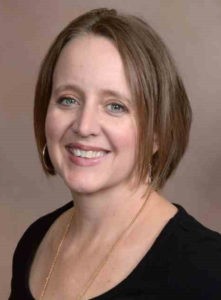“It does not have to be this way.”
I am anxiously awaiting my faith community as a whole to say this for women. To say that being abused and harassed as a pastor or layperson can be addressed and not written off as an unfortunate occurrence because we live in an imperfect world.
Not only to say it, but to actively work toward a future where women don’t have to endure the abuse and then advocate for themselves when abused. I’m awaiting a faith world that sees women’s abuse and harassment as its responsibility and no longer leaving it to women to fend for themselves.

Lindsay Bruehl
In a recent seminary class, a woman who works at a church as a minister shared with us that she has been treated inappropriately — verbally, emotionally and physically — by men in her congregation. The support she gets from the congregation and staff leadership is little to none.
The support she got from our class also was concerning because we were asking the wrong questions.
This is where the church and academia share the same problem. The reality is a majority of pastors are men, and male professors need to hear this too, because pastors and professors do not hear the pain of women when it is spoken.
Reports of abuse too often are viewed as problems to be solved by the victim herself. In the case of my classmate, her senior pastor has told her to do what she needs, and he will have her back. But he is not willing to take the lead in addressing the problem; it’s up to her.
Why is this being placed on the one who has been victimized and needing pastoral care and someone to fight for her?
Even our class discussion tended to place responsibility on the victim, advising her to go around the pastor to report the abuse. Her response: Historically, women get punished for doing that. She does not have the privilege in life to take that risk.
“Reports of abuse too often are viewed as problems to be solved by the victim herself.”
No one in the class appeared to see this as their responsibility to address. The flaw in the system is that none of us see this as our responsibility.
My classmate is not the only woman having this experience. Women are wondering how we can protect ourselves in a culture like this. We are being advised not be alone with people, or to have windows in office doors, and to make sure someone is around when you talk with a parishioner. Already that is creating a culture of mistrust. How can we create a culture of trust?
I can bear witness that these ideas come from the complementarian church, a church I once was a part of. These measures only protect the abuser — never the abused.
I live with complex trauma that I did not know I had until I started seminary. I started having serious panic attacks at the beginning of school. These attacks would wipe me out for days. I also was having days where I would be in deep depression, unable to smile, and I was irritable and angry with everybody. And I was tired.
I wanted people to hear me, but the way my message was being received, and I am sure delivered, was not at all what I was saying, and it would traumatize me again when assumptions were made about what I said instead of being met with tenderness and more curiosity. This is why it is necessary to follow up with questions when someone is speaking out of deep pain, instead of assuming you know what they are saying.
Sometimes it is the open wound that is speaking instead of the scar. Being trauma-informed would help pastors and professors know this is not a time to give advice, but to be present and listen. I have had several professors, a bunch of pastors and friends do this for me. This is why I did not quit when I thought for sure I was done.
“When will we work toward building a culture of trust and accountability, instead of mistrust and disconnection?”
Some of my own trauma has come from my church past. Knowing this, I’ve learned that I cannot abandon myself and stay in a class that allows the theology of my past to come up and go unchallenged. It will trigger me and close my mind to learning because my brain is now stressed.
One semester, I was graced with a professor who worked with me one-on-one so I did not have to drop a class my mental health could not bear. It is not weakness that I walked away, or an inability to lead; it is strength that I said I cannot stay.
The lesson, though, is that academia must change the system so women who have been abused or traumatized do not have to leave classes in order to heal. I happened to be with the right people who helped me and made it possible for me not to drop the class. The tenderness of the professor who worked with me and cared for my spiritual needs as well as my academic needs opened my mind to learning again. That class became one of my favorites.
That’s why I found myself identifying so strongly with my classmate who serves a congregation that will not take her cries for help seriously and instead makes change her responsibility.
When will we say it does not have to be this way? When will we work toward building a culture of trust and accountability, instead of mistrust and disconnection simply because it is harder to do the work of changing the system that has been in place for far too long?
Lindsay Bruehl is a master of divinity student at Perkins Seminary at SMU, where she works with the Baptist House of Studies. This semester, she’s also serving in an internship at her home congregation, Wilshire Baptist Church in Dallas.
Related articles:
Du Mez sees link between sexual abuse cover up and complementarian theology
On clergy sexual abuse, CBF-BWIM safe church resources help response, education, prevention
Kieve senses a calling to new role helping churches prevent and respond to sexual abuse


